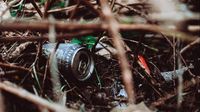ETOBICOKE, Ontario, April 21, 2025 (GLOBE NEWSWIRE) -- This Earth Day, on April 22, Cleanfarms shines a light on the vital role Canadian farmers play – their innovative spirit and deep-rooted dedication are key to environmental stewardship in agricultural recycling. “Farmers have always been at the heart of environmental stewardship,” says Barry Friesen, Executive Director of Cleanfarms. “Real change happens when farmers plant their boots on the ground and take the lead. From used crop input containers, to grain and silage bags, to every piece of used twine that’s returned for recycling – all of this and much more means less ag plastic that goes into the environment or the landfill — and that really adds up.”
Take something as simple as the return of used 23L pesticide and fertilizer containers: in 2024, Canadian farmers brought back 2.2 million kg to Cleanfarms' over 1,300 collection sites nationwide. With a strong three-year average recovery rate of 78% (2021–2023), these containers are transformed into useful farm products in North America, reducing reliance on virgin plastics and supporting a circular economy. As these sites open for the 2025 collection season, it’s a timely reminder of the value and the effort of all those who contribute to recycling these and many other materials in the agricultural recycling chain.
Across Canada, farmers are engaging with a growing array of Cleanfarms programs, such as: grain bags and agricultural twine across the Prairies; a Canada-wide recycling program for large non-deposit plastic totes and drums for pesticides and fertilizers; safe disposal of unwanted pesticides and old livestock and equine medications; and in Quebec, several types of agricultural plastics, including maple sap tubing, are addressed through recycling programs. Other types of plastics, such as bags for animal feed, peat moss, and animal bedding, are directed to responsible waste management channels.
These aren’t just programs—they’re partnerships in action. Cleanfarms works closely with farmers, collection site staff, and industry partners to pilot innovative recycling strategies across provinces. By testing and refining solutions on the ground, we’re building practical systems that connect innovation with on-farm impact.
“This Earth Day, we’re not just recognizing the progress we’ve made,” adds Friesen. “We are strengthening partnerships, pilot projects, and community action that move us closer to a truly circular economy for used agricultural products and packaging.” These programs are helping to shape a future where recycling and responsible management of ag plastics are a routine part of farming, supporting the health of the land and the generations who will continue to work it.
Meanwhile, for Earth Day 2025, Jour de la Terre Canada is launching a national campaign with the slogan "Pour protéger la biodiversité, ouvrons les yeux" (To protect biodiversity, open your eyes). The campaign, created by Hula Hoop, was launched on April 7, 2025, across the country and is designed as an interactive "search and find" game where participants locate 10 threatened species in an illustration.
A 40 x 6 feet mural was installed in downtown Montreal on Sainte-Catherine Street near Saint-Denis, drawing attention and inviting passersby to engage with the theme of biodiversity. The campaign includes an online game where users have 3 minutes to find the 10 hidden species, with educational content provided for each species discovered.
“The biodiversity is a crucial issue for the future of our planet, and every action counts for raising awareness and mobilizing citizens,” stated Marc-André Dionne, President and Chief Operating Officer of Hula Hoop Montreal. The campaign aims to cultivate curiosity and highlight the importance of recognizing biodiversity in our everyday surroundings.
In another significant initiative, GoRecycle is emphasizing the importance of recycling old refrigeration and air conditioning equipment as a means to reduce carbon footprints. Recognized by RECYC-QUÉBEC, GoRecycle has over 600 collection points across Quebec and has recovered more than 560,000 appliances since its inception, preventing over 481,000 tonnes of greenhouse gases.
“Each improperly recycled appliance generates one tonne of greenhouse gases. Conversely, each properly recycled appliance avoids emissions equivalent to a flight from Montreal to Barcelona,” explained Jules Foisy Lapointe, General Director of GoRecycle. The organization is committed to educating the public about responsible recycling practices and aims to make these actions a natural reflex.
As Earth Day approaches, various local events are also being organized. For instance, the first edition of "Célébrons le Jour de la Terre" will be held in Varennes on Sunday, April 27, 2025, from 1 PM to 4 PM at the Polydôme du parc Pré-Vert. This event will feature thematic kiosks focused on species preservation, water quality, sustainable gardening, and the role of urban animals.
Participants can engage in eco-friendly crafts and makeup workshops, as well as an introduction to active transportation highlighting cycling, scooters, and skateboards. Two interactive workshops will also allow participants to discover beeswax candle making and urban beekeeping. Radio V will provide entertainment for the day, making it a fun and educational experience for families.
As citizens reflect on the significance of Earth Day, many are voicing their concerns and suggestions for government action. Issues ranging from climate change, waste management, and the protection of flora and fauna are at the forefront of discussions. Suggestions include promoting ecological maintenance of residential land, rejecting environmentally harmful projects, and investing in sustainable public transportation.
With the first Earth Day celebrated on April 22, 1970, the day serves as a reminder of the ongoing commitment needed to protect our planet. As communities come together to advocate for environmental responsibility, each action taken contributes to a larger movement towards sustainability.
As we celebrate Earth Day this year, the collective efforts of farmers, organizations, and individuals highlight the importance of innovation, education, and action in creating a healthier planet for future generations.







